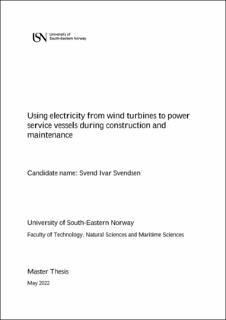| dc.description.abstract | This master thesis is conducted based on an in-depth study on literature as well as a cases study with the aim of investigating whether the charging and operation of electrical service vessels such as Offshore Access Vessel (OAV) and Crew Transfer Vessel (CTV) is economically, technically and environmentally sustainable for using in the shipping industry.
In order to fulfil the aim of this thesis, a qualitative method in the form of a case study was performed. The chosen case studied the Offshore Wind Farm (OWF) service vessels that are responsible for the construction and maintenance phase of installing the turbines in the wind parks. The theoretical information in this thesis was gathered through reviewing different sources and talking to experts in this field. In addition, in order to better understand the research topic, a literature review was conducted. Initially, more than 1300 materials, such as scientific reports, articles, and books releated to the research topic, were extracted from the research engines. Later 29 articles aligned with the key research strings, namely: electric service vessel, offshore wind farm, maintenance on wind turbine, technology offshore wind farm, power consumption hybrid vessel, recharging on-site, and wind turbine installationwere retrieved.
The outcome of this master thesis showed that it is technically feasible to charge the vesselsin the wind farm under special circumstances such as weather conditions, availability of charging infrastructure, and approved permissions. In addition, using a battery solution is more environmentally friendly and can reduce up to 48 per cent of the CO2 emissions. Furthermore, it was calculated that the shipping company could save more than 17 per cent of fuel costs compared to diesel power engines. | en_US |
